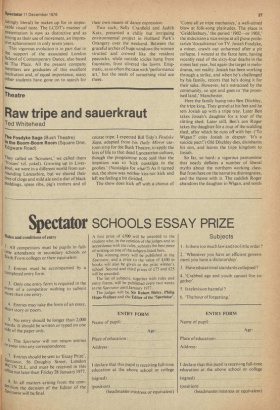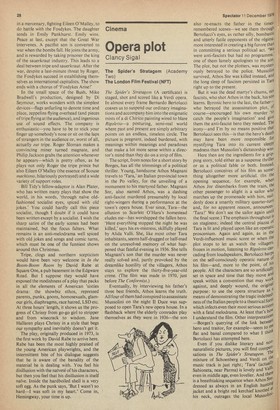Raw tripe and sauerkraut
Ted Whitehead
The Fosdyke Saga (Bush Theatre) In the Boom-Boom Room (Square One, Edgware Road) I:hey called us 'Scousers,' we called them Yoxies' (cf. yokel). Growing up in LiverPool, we were in a different world from surrounding Lancashire, but we shared their love of clogs and mild ale and a diet of black Puddings, spare ribs, pig's trotters and of
course tripe. 1 expected Bill Tidy's Fosdyke Saga, adapted from his Daily Mirror cartoon strip for the Bush Theatre, to apply the kiss of life to that dead Lancastrian culture, though the programme note said that the intention was to 'kick nostalgia in the goolies.' (Nostalgia for what?) As it turned out, the show was neither kiss nor kick and left me feeling a bit divided.
The show does kick off with a chorus of
'Come all ye tripe mechanics,' a well-aimed blow at folk-song platitudes. The place is 'Griddlesbury,' the period '1902—or 1903,' the indecision a nice swipe at all those proletarian `docudramas' on TV. Josiah Fosdyke, a miner, crawls out unharmed after a pit collapse. I winced at the farce here, having recently read of the sixty-four deaths in the mines last year, but again the target is melodrama, not reality. Josiah has been working through a strike, and when he's challenged by his family, retorts that he's doing it for their sake. However, he's ostracised by the community, so ups and goes to 'the promised land,' Manchester.
Here the family bump into Ben Ditchley, the tripe king. They grovel at his feet and he sets Josiah up with a tripe tray. Later Ben takes Josiah's daughter for a tour of the slitting shed. Later still, Ben's son Roger takes the daughter for a tour of the scalding shed, after which he runs off with her. ('To Wigan ?' cries Josiah in despair. 'It's a suicide pact !') Old Ditchley dies, disinherits his son, and leaves the tripe kingdom to Josiah.
So far, so hard: a vigorous pantomime that neatly deflates a number of liberal myths about the northern working class. But from here on the narrative disintegrates, and the theme with it. The caddish Roger abandons the daughter in Wigan, and sends in a mercenary, fighting Eileen O'Malley, to do battle with the Fosdykes. The daughter sends in Emily Pankhurst. Emily wins.
Peace at last, except that the Great War intervenes. A pacifist son is converted to war when the bombs fall. He joins the army, and is rewarded by taking prisoner the king of the sauerkraut industry. This leads to a deal between tripe and sauerkraut. After the war, despite a last-minute threat by Roger, the Fosdykes succeed in establishing themselves as international capitalists. The show ends with a chorus of 'Fosdykes Arise!'
In the small space of the Bush, Mike Bradwell's production, designed by Di Seymour, works wonders with the simplest devices—flags unfurling to denote time and place, zeppelins flying overhead (and pieces of tripe flying at the audience), and ingenious use of sound effects. The company is enthusiastic—you have to be to stick your finger up somebody's nose or sit on the laps of strangers in the audience or, worst of all,
actually eat tripe. Roger Sloman makes a convincing miner turned magnate, and
Philip Jackson grabs the attention whenever he appears—which is pretty often, as he plays not only Roger the tripe prince but
also Eileen O'Malley (the essence of Scouse machismo, hilariously portrayed) and a wide variety of support roles.
Bill Tidy's fellow-adaptor is Alan Plater, who has written many plays that show the world, in his words, 'through naive old fashioned socialist eyes, spiced with old jokes.' You could hardly call this piece socialist, though I doubt if it could have been written except by a socialist. I wish the sharp satire of the early scenes had been maintained, but the focus falters. What remains is an anti-melodrama well spiced with old jokes and songs and comic turns, which must be one of the funniest shows around this Christmas.
Tripe, clogs and northern scepticism would have been very welcome in In the Boom-Boom Room by David Rabe at
Square One, a pub basement in the Edgware Road. But I suppose they would have exposed the modishness of a play that packs in all the elements of American 'sixties drama: the showbiz ethos, repressed parents, punks, goons, homosexuals, glamour girls, diaphragms, race hatred, LSD etc.
At three hours' length, it shows us the progress of Chrissy from go-go girl to stripper and from wisecrack to wisdom. Jane Hallaren plays Chrissy in a style that begs our sympathy and inevitably doesn't get it.
The play, originally produced in 1973, is the first work by David Rabe to arrive here. Rabe has been the most highly praised of the young American playwrights, and the intermittent bite of his dialogue suggests that he is aware of the banality of the material he is dealing with. You feel his disillusion with the naiveté of his characters, but then you feel that his disillusion is itself naive. Inside the hardboiled shell is a very soft egg. As the punk says, 'But I wasn't so hard—I was soft in my heart.' Come in, Hemingway, your time is up.



































 Previous page
Previous page